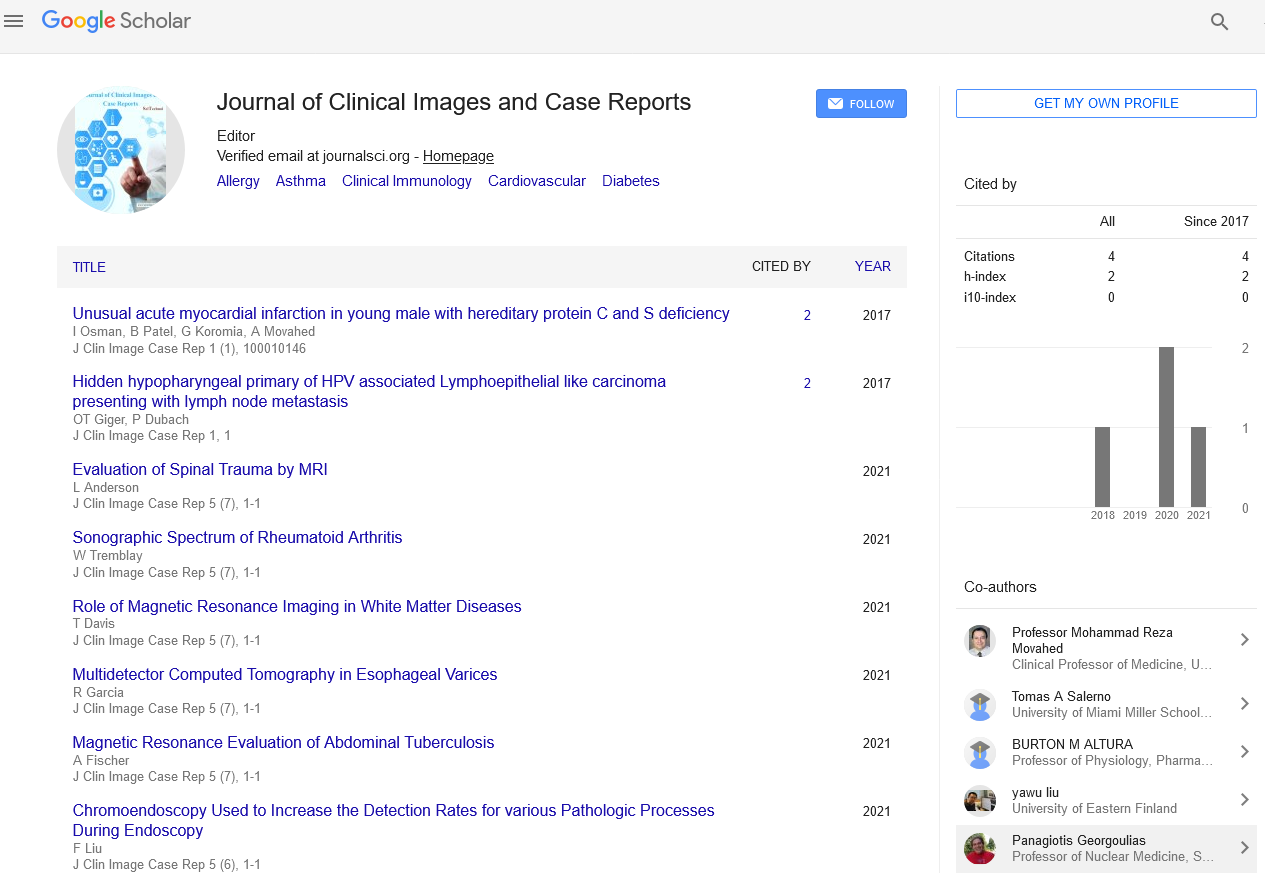Perspective, J Clin Image Case Rep Vol: 7 Issue: 1
Applied Translational Immunology of Cardiovascular Disease
William Ho W*
Department of Pathology and Immunology, University of Geneva, CH-1211 Geneva, Switzerland
*Corresponding Author: William Ho W
Department of Pathology and
Immunology, University of Geneva, CH-1211 Geneva, Switzerland
E-mail: william_ho@ edu.sg
Received date: 27 January, 2023, Manuscript No. CICR-23-90210;
Editor assigned date: 30 January, 2023, PreQC No. CICR-23-90210(PQ);
Reviewed date: 14 February, 2023, QCNo CICR-23-90210;
Revised date: 21 February 2023, Manuscript No. CICR-23-90210 (R);
Published date: 28 February 2023 DOI: 10.4172/CICR.1000230.
Citation: William Ho W (2023) Applied Translational Immunology of Cardiovascular Disease. J Clin Image Case Rep 7:1.
Description
Translational immunology is the study of applying basic immunological knowledge to develop novel therapeutic strategies for treating diseases. In the context of cardiovascular disease, the application of translational immunology involves studying the interaction between the immune system and cardiovascular system to develop new therapies and biomarkers. Cardiovascular Disease (CVD) is the leading cause of death globally, accounting for nearly 18 million deaths each year. Inflammation plays a critical role in the development and progression of CVD, particularly in atherosclerosis. Atherosclerosis is a chronic inflammatory disease characterized by the accumulation of cholesterol and immune cells in the walls of arteries, leading to the formation of plaques that can rupture and cause heart attacks and strokes.
Translational immunology
Translational immunology is an interdisciplinary field that aims to apply knowledge of the immune system to develop new diagnostic and therapeutic approaches for a variety of diseases. It involves the translation of basic research findings in immunology to clinical applications, such as the development of new therapies, vaccines, and diagnostic tests. The immune system plays a critical role in maintaining health by protecting the body against infectious agents and foreign substances. Dysregulation of the immune system can lead to the development of various diseases, including autoimmune disorders, allergies, and cancer.
Functioning: Translational immunology research seeks to understand the mechanisms underlying these diseases and develop new strategies for prevention and treatment. One example of translational immunology research is the development of immunotherapies for cancer. Immunotherapy harnesses the power of the immune system to recognize and attack cancer cells.
Treatment: Several immunotherapies, such as immune checkpoint inhibitors, have been approved for the treatment of various types of cancer, and ongoing research is exploring new ways to improve their efficacy and reduce side effects. Another example of translational immunology research is the development of new vaccines. Vaccines stimulate the immune system to recognize and respond to specific pathogens, providing protection against infectious diseases. Recent advances in immunology have led to the development of new types of vaccines, such as mRNA vaccines, which have shown remarkable efficacy in preventing COVID-19.
Diagnosis: Translational immunology research is a rapidly evolving field with the potential to revolutionize the diagnosis and treatment of a wide range of diseases. By bridging the gap between basic research and clinical applications, translational immunology has the potential to improve health outcomes and transform patient care. Translational immunology research in CVD focuses on identifying and targeting the immune cells and pathways involved in atherosclerosis. One example is the use of monoclonal antibodies that target pro-inflammatory cytokines such as Interleukin-1β (IL-1β) or Interleukin-6 (IL-6). These antibodies have shown promising results in reducing inflammation and cardiovascular events in patients with CVD.
Another approach is to target immune cell activation and migration into the arterial wall. Inhibiting chemokine’s and adhesion molecules, which are involved in immune cell trafficking, can reduce the recruitment of immune cells to the arterial wall and slow the progression of atherosclerosis. In addition to developing new therapies, translational immunology research in CVD also aims to identify biomarkers that can predict disease progression and response to therapy. For example, measuring the levels of certain immune cells or cytokines in the blood or plaque samples can provide insights into the immune response in atherosclerosis and help identify patients who are at higher risk of developing CVD or who may benefit from targeted immunomodulatory therapies.
Applications
Overall, the application of translational immunology to cardiovascular disease has the potential to lead to new therapeutic approaches and improve patient outcomes by targeting the underlying inflammation and immune dysregulation that contribute to the development and progression of CVD. Cardiovascular Disease (CVD) is a term used to describe a group of conditions that affect the heart and blood vessels, including coronary artery disease, heart failure, and stroke.
• These conditions are the leading cause of death worldwide, accounting for approximately 18 million deaths each year. CVD can develop as a result of a variety of factors, including high blood pressure, high cholesterol, smoking, obesity, physical inactivity, and diabetes.
• These risk factors can cause damage to the blood vessels and lead to the accumulation of fatty deposits (plaques) in the arteries, a process known as atherosclerosis.
• Over time, these plaques can rupture, leading to the formation of blood clots that can cause heart attacks or strokes.
Symptoms of CVD can vary depending on the specific condition but may include chest pain, shortness of breath, fatigue, swelling in the legs, and palpitations. Treatment for CVD may include lifestyle changes, medications, or surgery, depending on the severity of the condition and the individual patient's needs. Prevention is an important aspect of managing CVD. This includes maintaining a healthy diet, engaging in regular physical activity, avoiding smoking, and controlling blood pressure, cholesterol, and blood sugar levels. Regular check-ups with a healthcare provider can help identify and manage risk factors for CVD early, before they lead to more serious complications.
 Spanish
Spanish  Chinese
Chinese  Russian
Russian  German
German  French
French  Japanese
Japanese  Portuguese
Portuguese  Hindi
Hindi 